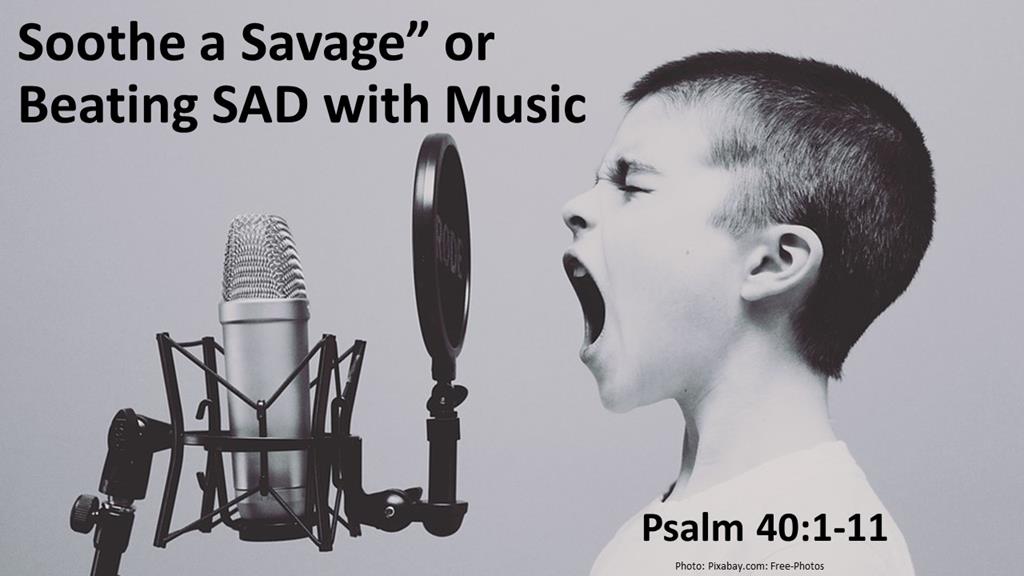 Jeff Garrison
Jeff Garrison
Skidaway Island Presbyterian Church
Psalm 40:1-11
January 12, 2020
Between Christmas and Lent, we’re exploring Spiritual Affective Disorder. Many people during winter, when the days are short, suffer for a Seasonal Affective Disorder. It’s due to the lack of natural light. When we don’t receive the light that comes from God, our spirits can also be troubled. Each week, I’ll suggest strategies we might use to break the cycle of despair. One way to get us out of the doldrums is music. As I read from the first eleven verses of Psalm 40, listen for what the Psalmist has to say about music. Read Psalm 40:1-11.
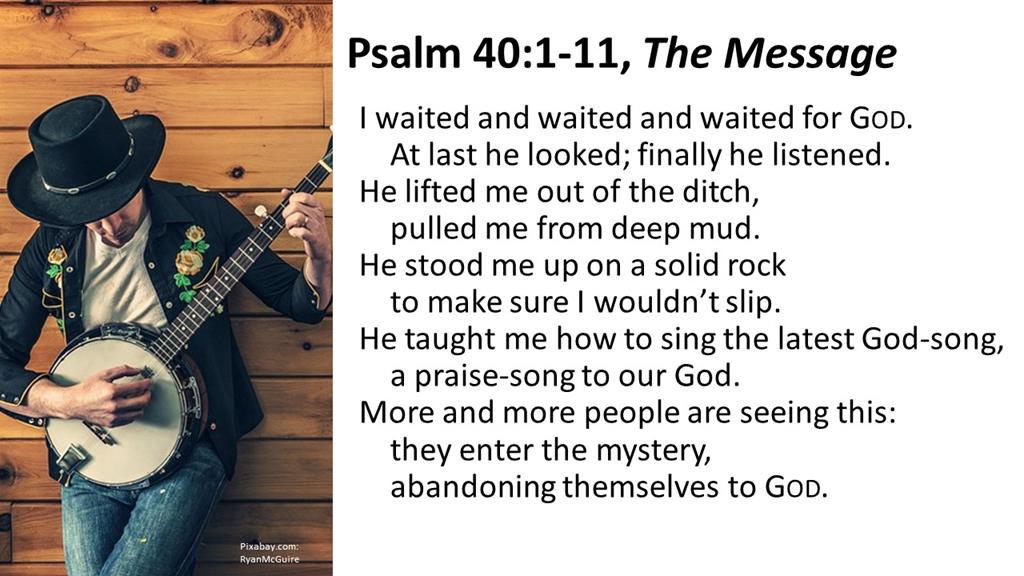
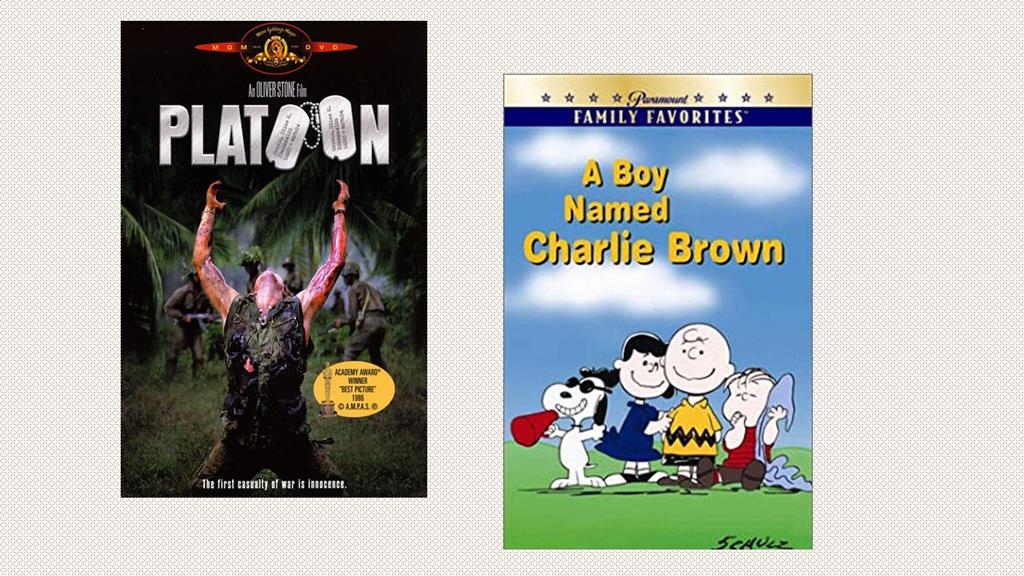 There is something about music that can take us to a place and time in the past. Those in the advertising world have known this for a long time which is why they often use popular music in the background to help sell products. Movie producers are no different as they use music to put us into the mood they are trying to convey. I don’t think I’ll ever forget the sadness, yet hopefulness, brought about from watching the movie, “Platoon.” These feelings were intensified by Samuel Barber’s haunting score, “Adagio in Strings.” Or, on a more positive note, think of the upbeat tunes used in the Charlie Brown movies. How does those tunes make you feel?
There is something about music that can take us to a place and time in the past. Those in the advertising world have known this for a long time which is why they often use popular music in the background to help sell products. Movie producers are no different as they use music to put us into the mood they are trying to convey. I don’t think I’ll ever forget the sadness, yet hopefulness, brought about from watching the movie, “Platoon.” These feelings were intensified by Samuel Barber’s haunting score, “Adagio in Strings.” Or, on a more positive note, think of the upbeat tunes used in the Charlie Brown movies. How does those tunes make you feel?
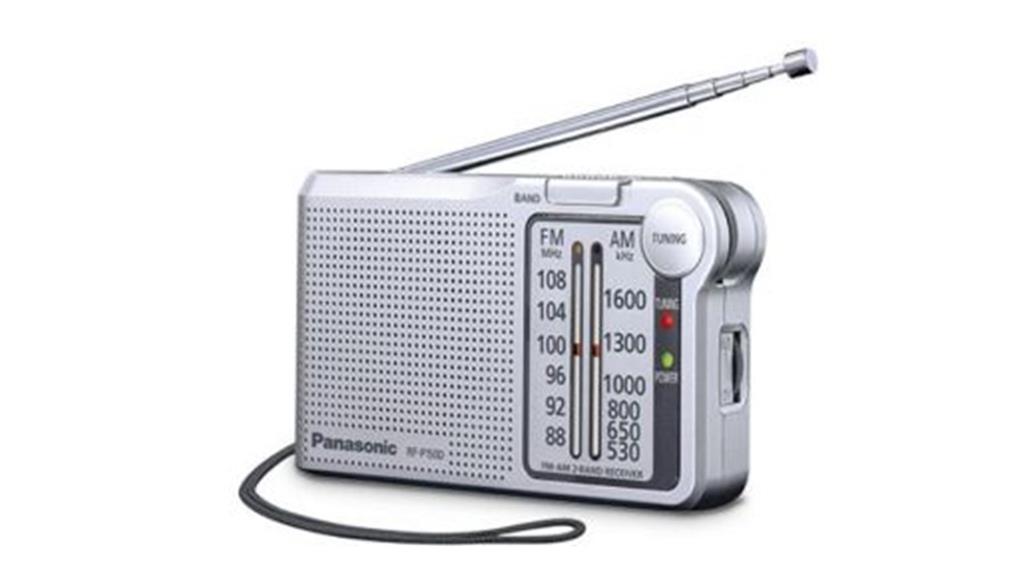 Music has a power to draw us back to specific places in time, which is why it’s often used in therapy for those battling Alzheimer’s or brain injuries. From my own life, there are songs that can take me back just by listening to them. The Beatles’ “Lucy in the Sky” takes me to my childhood bedroom, in a late December evening in 1968. I was listening to the radio I received for Christmas that year. Rod Stewart’s “Maggie May,” takes me back to a wet night camping at Fort Fisher. A friend and I listened to the radio while trying to endure wet sleeping bags. The Eagles’ “Hotel California,” takes me to another rainy night, when I was in college. With kayaks strapped to the top of my car, my brother and I drove to the North Carolina Mountains to paddle in rain swollen rivers. I had no idea then that I’d hear that song so many times over the next few decades that I would become sick of it. Every time I hear haunting voice of Enya, the Irish singer, I am taken back to a drive over Sonora Pass in the Sierras at sunset. I’m sure you have such experiences, too.
Music has a power to draw us back to specific places in time, which is why it’s often used in therapy for those battling Alzheimer’s or brain injuries. From my own life, there are songs that can take me back just by listening to them. The Beatles’ “Lucy in the Sky” takes me to my childhood bedroom, in a late December evening in 1968. I was listening to the radio I received for Christmas that year. Rod Stewart’s “Maggie May,” takes me back to a wet night camping at Fort Fisher. A friend and I listened to the radio while trying to endure wet sleeping bags. The Eagles’ “Hotel California,” takes me to another rainy night, when I was in college. With kayaks strapped to the top of my car, my brother and I drove to the North Carolina Mountains to paddle in rain swollen rivers. I had no idea then that I’d hear that song so many times over the next few decades that I would become sick of it. Every time I hear haunting voice of Enya, the Irish singer, I am taken back to a drive over Sonora Pass in the Sierras at sunset. I’m sure you have such experiences, too.
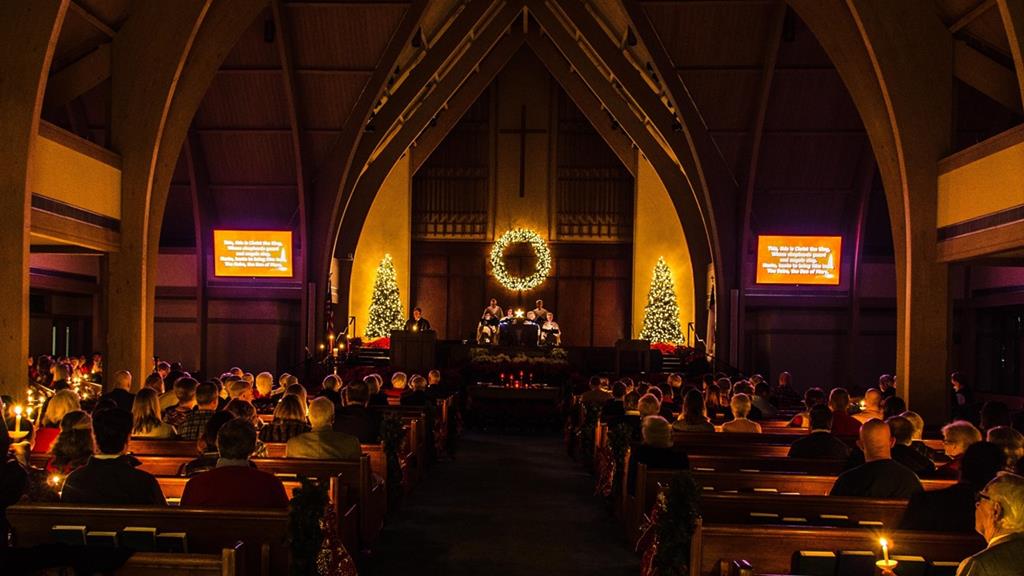 The same can be said about church and music. Maybe there was a special Christmas Eve service in which you sang, “What Child is This? and are taken back to that time. Sometimes we’re taken back to sad memories such as a song sung at a funeral. “He Leadeth Me,” was a favorite hymn of my great-grandfather McKenzie. I don’t remember him singing it as I was only 12 when he died. But I do recall the pastor officiating at his service sharing this insight. Now, whenever I hear that hymn, I am reminded of my great-grandfather and that great cloud of witnesses that have led us to his place.[1] Or maybe it’s a funny memory. I love the majesty of God presented in the hymn “Holy, Holy, Holy,” but every time I sing it, I also am reminded of my Grandfather Garrison, boldly singing this hymn, that has been referred to as the Presbyterian National Anthem, off-key.[2] And if I could tell he was off-key, you can be assured he was far off. But Granddaddy sang with gusto! I shudder when I think of the hymns that will remind my kids of me.
The same can be said about church and music. Maybe there was a special Christmas Eve service in which you sang, “What Child is This? and are taken back to that time. Sometimes we’re taken back to sad memories such as a song sung at a funeral. “He Leadeth Me,” was a favorite hymn of my great-grandfather McKenzie. I don’t remember him singing it as I was only 12 when he died. But I do recall the pastor officiating at his service sharing this insight. Now, whenever I hear that hymn, I am reminded of my great-grandfather and that great cloud of witnesses that have led us to his place.[1] Or maybe it’s a funny memory. I love the majesty of God presented in the hymn “Holy, Holy, Holy,” but every time I sing it, I also am reminded of my Grandfather Garrison, boldly singing this hymn, that has been referred to as the Presbyterian National Anthem, off-key.[2] And if I could tell he was off-key, you can be assured he was far off. But Granddaddy sang with gusto! I shudder when I think of the hymns that will remind my kids of me.
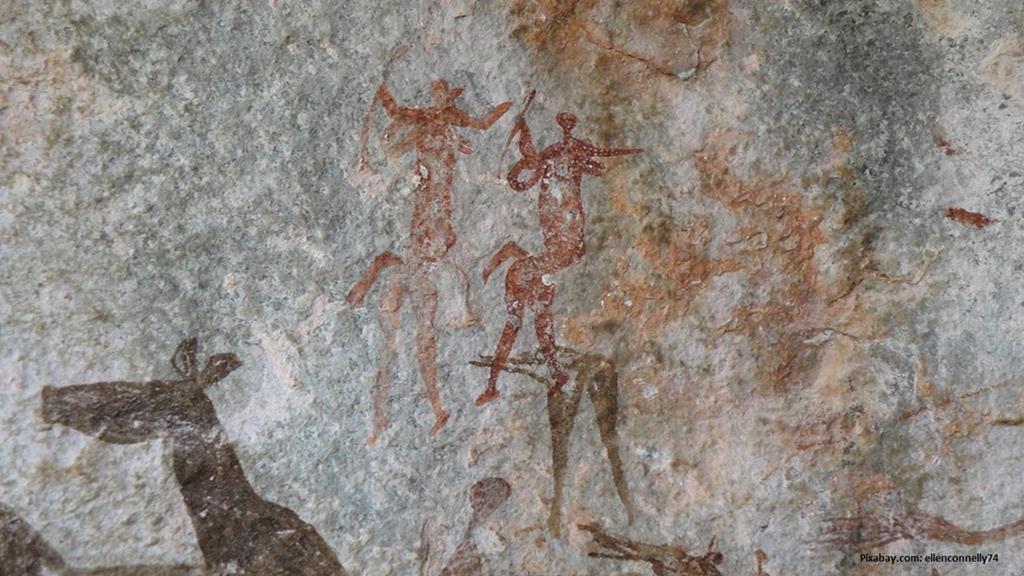 Music has ancient roots. Archaeologists learned to discover cave art when exploring in France by singing. They discovered that caves with the most resonance for singing were also the places where they were more likely to discover cave paintings. Many anthropologists believe that music was first used as a way to strengthen community bonds, maybe even going back to the prehistoric cavemen.[3] Anecdotally, this idea of music strengthening communities seems true for if you talk to people about music: those of different generations will tend to gravitate to what was popular when they were teenagers or young adults. Music helps form our bonds.
Music has ancient roots. Archaeologists learned to discover cave art when exploring in France by singing. They discovered that caves with the most resonance for singing were also the places where they were more likely to discover cave paintings. Many anthropologists believe that music was first used as a way to strengthen community bonds, maybe even going back to the prehistoric cavemen.[3] Anecdotally, this idea of music strengthening communities seems true for if you talk to people about music: those of different generations will tend to gravitate to what was popular when they were teenagers or young adults. Music helps form our bonds.
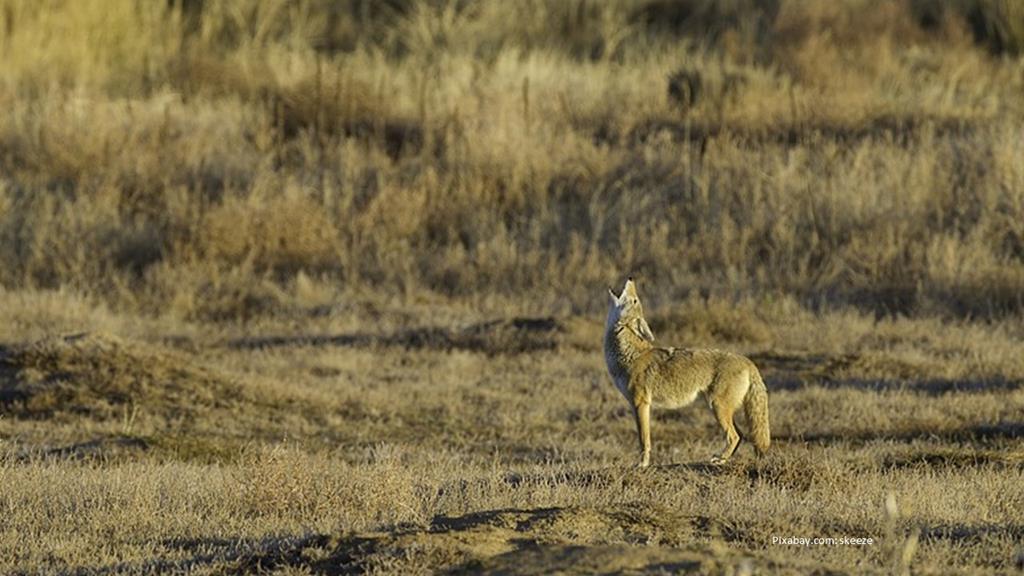 And music seems to exist beyond the human experience. There have been a lot of talk about coyotes on our island lately, but have you ever heard a pack of coyotes sing? It’s haunting yet beautiful. Each coyote has a slight variation to the song.[4] Have you heard recordings made of whales singing? Certainly, we’ve all heard songbirds sing. One of the memories I’ll always have about Michigan is how, in early March, I’d realize the birds were back as they start singing when it was still dark, before dawn. It was as if they were challenging winter, reminding us it wouldn’t be long before it was over. In a way, all creation sings so it’s natural for those of us who are humans to join in songs of cosmic praise.
And music seems to exist beyond the human experience. There have been a lot of talk about coyotes on our island lately, but have you ever heard a pack of coyotes sing? It’s haunting yet beautiful. Each coyote has a slight variation to the song.[4] Have you heard recordings made of whales singing? Certainly, we’ve all heard songbirds sing. One of the memories I’ll always have about Michigan is how, in early March, I’d realize the birds were back as they start singing when it was still dark, before dawn. It was as if they were challenging winter, reminding us it wouldn’t be long before it was over. In a way, all creation sings so it’s natural for those of us who are humans to join in songs of cosmic praise.
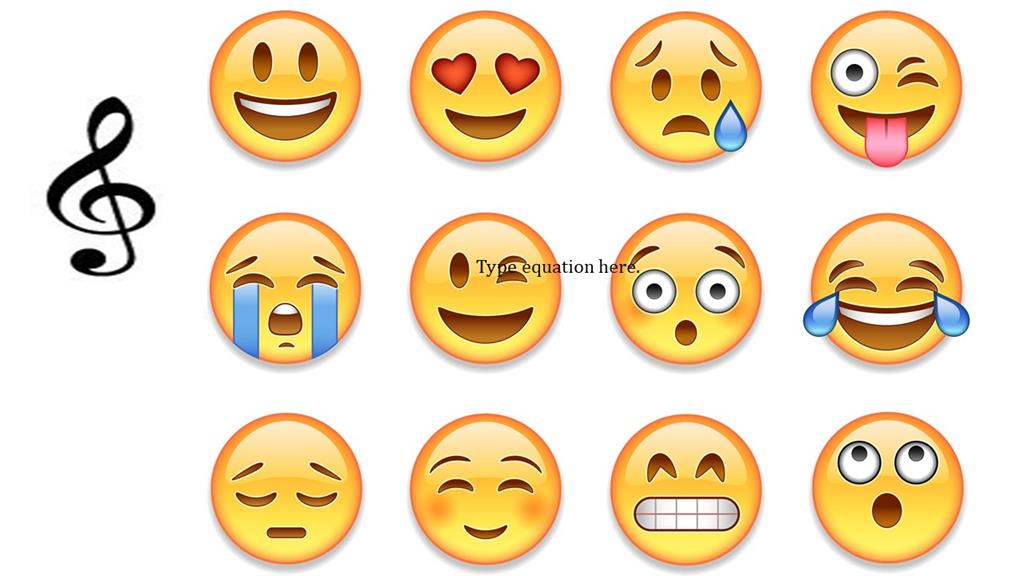 Melody can change our disposition. Depending on the tune, it can make us sad or happy, reflective or energetic.[5] All of these are valid experiences and hopefully in our music on Sunday, we experience most of them. We may not experience all emotions every Sunday, but over a collection of Sundays, music should speak to all our moods. God is so big. God is God of our joys and our sadness, so it takes a wide repertoire to even begin to cover the vastness of God’s presence. Another thing, not everyone prefers the same music. Therefore, we need to be open to what others like, along with being willing to expand our own repertoire. We’re all in different places and have different backgrounds and what speaks to one might not speak to another. And, what speaks to us one day might, on another day, become weary, like hearing “Hotel California” for the millionth time.
Melody can change our disposition. Depending on the tune, it can make us sad or happy, reflective or energetic.[5] All of these are valid experiences and hopefully in our music on Sunday, we experience most of them. We may not experience all emotions every Sunday, but over a collection of Sundays, music should speak to all our moods. God is so big. God is God of our joys and our sadness, so it takes a wide repertoire to even begin to cover the vastness of God’s presence. Another thing, not everyone prefers the same music. Therefore, we need to be open to what others like, along with being willing to expand our own repertoire. We’re all in different places and have different backgrounds and what speaks to one might not speak to another. And, what speaks to us one day might, on another day, become weary, like hearing “Hotel California” for the millionth time.
 Now, what does all this have to do with Psalm 40? Our text for this morning, the first half of this Psalm, is an offering of thanksgiving to God. The Psalmist, this one is attributed to David, begins by recalling how he waited patiently for God to hear his cry. In the second and third verses, we hear how God pulled him up from the muck, put him back on firm footing, and taught him a new song. The Psalmist is humble, acknowledging everything that has been done for him is a gift from a benevolent God.[6]
Now, what does all this have to do with Psalm 40? Our text for this morning, the first half of this Psalm, is an offering of thanksgiving to God. The Psalmist, this one is attributed to David, begins by recalling how he waited patiently for God to hear his cry. In the second and third verses, we hear how God pulled him up from the muck, put him back on firm footing, and taught him a new song. The Psalmist is humble, acknowledging everything that has been done for him is a gift from a benevolent God.[6]
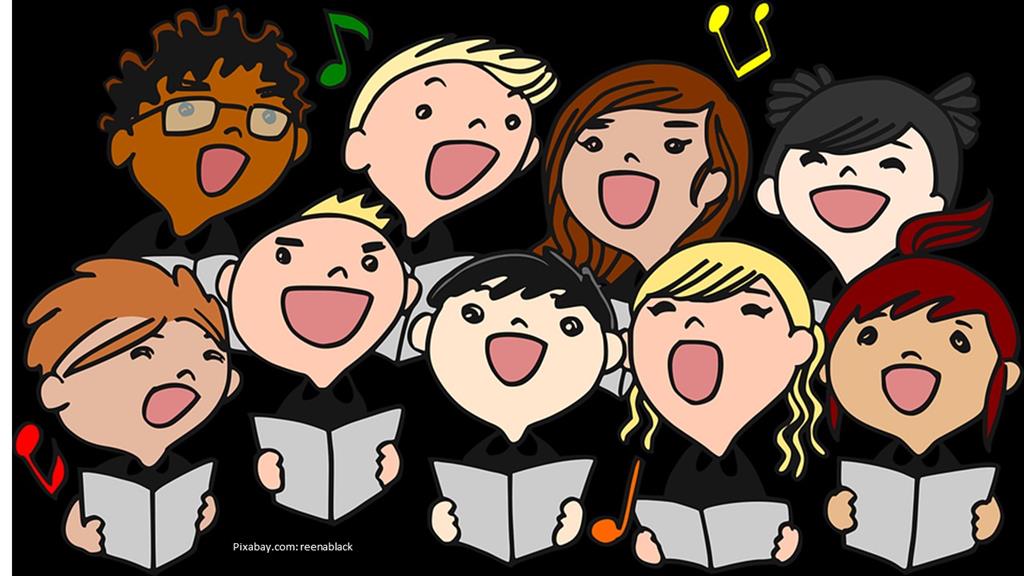 But let’s consider a moment the thought of God giving the Psalmist a new song. I like this idea: God as the great choirmaster, teaching us new music. In our early reading from Revelation, we heard about all the singing in heavenly courts.[7] Music may have had a long history within humanity, but it goes back even further, to creation, shortly after birds are introduced. And, from what we read, music is going to be around for a long time as we praise God in eternity. God will teach us the song, if we are just open to listening and hearing and rejoicing.
But let’s consider a moment the thought of God giving the Psalmist a new song. I like this idea: God as the great choirmaster, teaching us new music. In our early reading from Revelation, we heard about all the singing in heavenly courts.[7] Music may have had a long history within humanity, but it goes back even further, to creation, shortly after birds are introduced. And, from what we read, music is going to be around for a long time as we praise God in eternity. God will teach us the song, if we are just open to listening and hearing and rejoicing.
 Starting with verse four, the Psalmist calls on all who have experienced God’s grace and mercy to join him. He invites others to turn away from false gods, to turn away from that which is worship in the world, and to focus on God’s wondrous deeds. So not only is the Psalmist given a new song, he now uses this song to witness to others, showing what God has done in the world. The Psalmist does what the redeemed are supposed to do, give credit to God for our salvation.[8] God doesn’t show mercy as a way to receive sacrifices, the Psalmist says in verse 6, but to have us follow him and to delight in the word, the law, which God places in our heart.
Starting with verse four, the Psalmist calls on all who have experienced God’s grace and mercy to join him. He invites others to turn away from false gods, to turn away from that which is worship in the world, and to focus on God’s wondrous deeds. So not only is the Psalmist given a new song, he now uses this song to witness to others, showing what God has done in the world. The Psalmist does what the redeemed are supposed to do, give credit to God for our salvation.[8] God doesn’t show mercy as a way to receive sacrifices, the Psalmist says in verse 6, but to have us follow him and to delight in the word, the law, which God places in our heart.
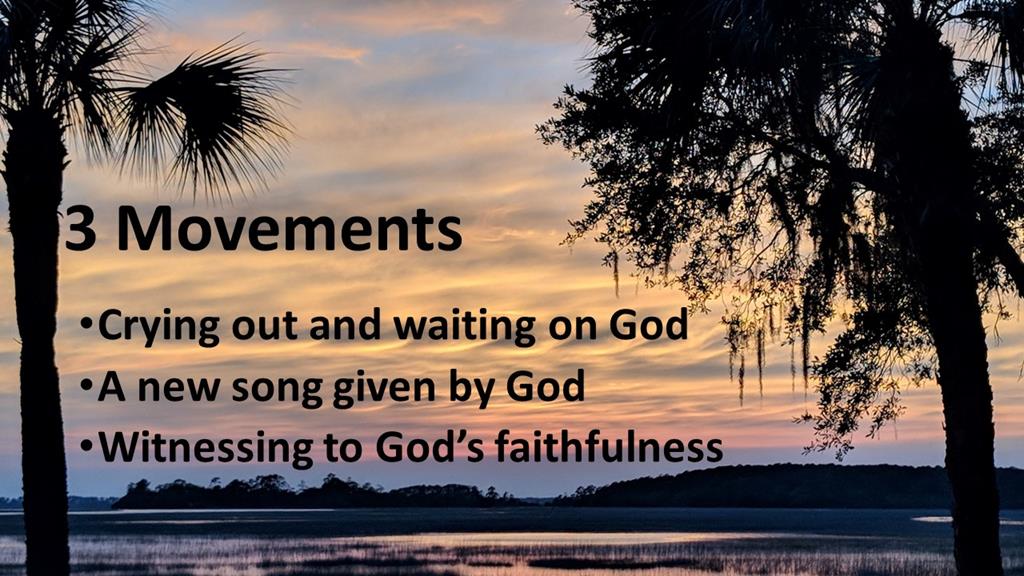 There are three important movements in this Psalm. The crying out and waiting on God to act, the new song that God provides, and our willingness to witness to God’s faithfulness. This is what the Christian life is to be about. We confess our hopelessness and helplessness to the one who can help. God hears our plea and responds gracefully. And then we tell (or better yet sing) of God’s good deeds as we witness of God’s goodness to a lost world.
There are three important movements in this Psalm. The crying out and waiting on God to act, the new song that God provides, and our willingness to witness to God’s faithfulness. This is what the Christian life is to be about. We confess our hopelessness and helplessness to the one who can help. God hears our plea and responds gracefully. And then we tell (or better yet sing) of God’s good deeds as we witness of God’s goodness to a lost world.
What can we take from all this? When you are feeling down, like the Psalmist, call out to God, trusting in the Almighty to hear. But also, be willing to listen and to sing, to praise God for what he has done in the past which gives us hope for the future. Make a playlist of songs you can listen to when you are down that will help lift your spirits. Today, such a list can be easily assembled using apps like Pandora, Spotify and Apple Music. If you’re technical at all, you can then have the music with you always (even on your phone), to help you overcome despair and embrace the beautiful world in which we live. I also encourage you to share with your church family music that has special meaning for you—you can do this either on our communication cards or email them to me and I’ll keep a running list which we can later publish.
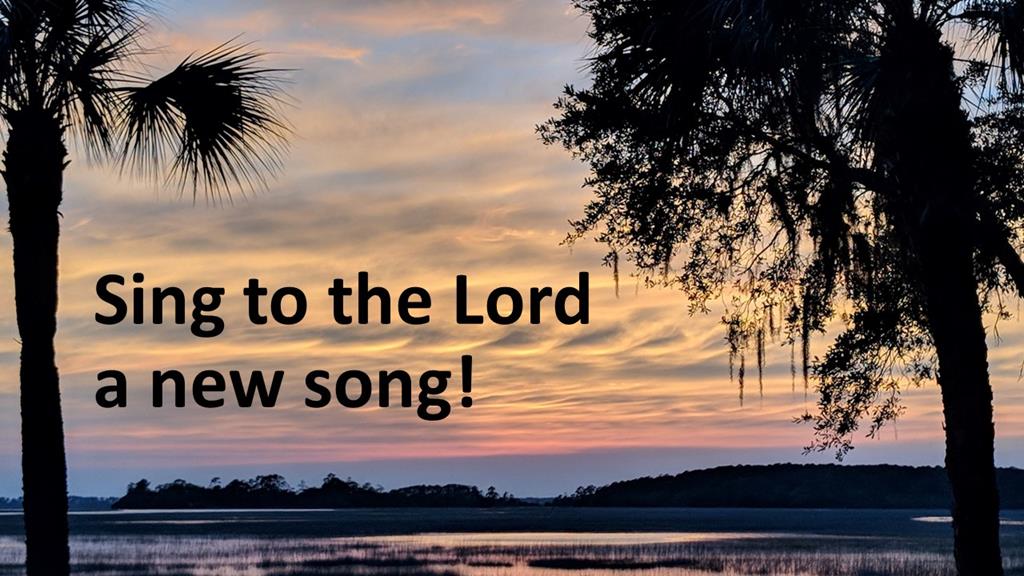 Let’s all be willing to sing new songs, songs that glorify and praise God, songs that lifts our hearts and prepare us to soar with joy. Amen
Let’s all be willing to sing new songs, songs that glorify and praise God, songs that lifts our hearts and prepare us to soar with joy. Amen
©2020
[1] Hebrews 12:1
[2] At an evangelism conference in the early 1990s, the pastor of Mt. Harmon Church of God in Atlanta jokingly called Holy, Holy, Holy the Presbyterian National Anthem and since I grew up in a church that sang it every Sunday at the beginning of Sunday School, it seemed right.
[3] Robert Jourdain, Music, the Brain, and Ecstasy as quoted and referred to by Marcia McFee, PhD., Think Like a Filmmaker: Sensory-Rich Worship Design for Unforgettable Messages (Truckee, CA: Trokay Prs, 2016), 127-128.
[4] For a discussion of coyote singing, see John Lane’s prologue “Redemption Song” in his book, Coyote Settles the South (Athens: Univ. of Georgia Press, 2016).
[5] This is my variation on Marcia McPhee’s list of patterns: thrust, shape, swing, and hang. See McFee, 136-139.
[6] Artur Weisner, The Psalms, translated by Herbert Hartwell, (Philadelphia: Westminster, 1962), 335.
[7] Revelation 5:6-14.
[8] James L. Mays, Psalms, (Louisville: John Knox Press, 1994), 168.

What an interesting post.
I think music really can help if you are feeling a little down.
Of course certain music can bring back memories too.
Where would we be without music?
All the best Jan
I find music to be one of God’s greatest creations and it often affects me so greatly that I can do nothing other than sit with my eyes closed when listening! Love this sermon and I’m going to have to link to it from my other blog. It’s wonderful!
Oh….and thanks. I now have Vince Guaraldi music (Charlie Brown) stuck in my head! (not necessarily a bad thing)
It’s not a bad tune to have running in your head, I agree. And I’m honored to have the sermon linked to your other blog (I need to read that blog more frequently).
I’m one who loves the foggy, wet days. I should move to Oregon or Washington state because in California we don’t have enough of those days to suit me.
I do love to listen to music, especially in the afternoon–I’m not sure why that time appeals, but it does. And I can imagine the sound of voices in those pre-historic caves, with the small flickering lamps. I was more than awed when I explored some small caves in the south of France, and now you’ve set me to speculating about hearing the sounds of early man’s voice or instruments that once echoed there.
I actually like a variety of days–Foggy days are fun to be outdoors–last year I did several open water kayak trips in the fog. It was a little dangerous but also enlightening as I had to trust and depend on my compass.
I truly need plenty of upbeat, hopeful music because all I see right now is a humongous dumpster fire of a civilization here on Earth.
We need to cherish what is good and hopeful, too!
Music really can boost someone’s mood. A friend of mine was recently putting together a list of songs that make people happy when they hear them. I suggested “Here Comes the Sun” by the Beatles. Interesting to me after reading your post, that it is a song with the lyrics about the coming of light. It has good memories for me as well. Great message here.
Here Comes the Sun is a great tune!
I’ve heard of Seasonal Affective Disorder. But this is my favorite time of year. I love the cloudy, gloomy, rainy days a lot more than bright sunny days.
Summers can be so brutal in Vegas, I can see why you prefer this time of the year
I got new knowledge about “a Seasonal Affective Disorder.” …… interesting.
The “Spiritual A D is a play on words.
Well, I certainly can’t argue with this. I’m a music teacher by profession and often must convince others of the value of what I do. Music exists in every human culture. It proceeds the written language in every culture. It predates mathematics, by a lot. It is vital to the human experience.
I didn’t know you were taught music. It is a subject I wish I had spent more time in when in school